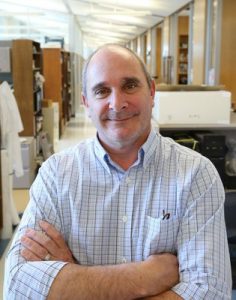
The National Institutes of Health featured the work of Fernando Pardo-Manuel de Villena, PhD, chair of the UNC Department of Genetics, in this article titled "Reproducibility of Rodent Models for Human Disease: MiniMUGA as a Critical Genetic Tool."
Here's an excerpt:
"Mice are a crucial resource for the scientific community. Scientific researchers from numerous disciplines use the mouse as a model to mimic and recapitulate diseases and test scientific questions related to human health and disease. These efforts include basic research, studies on the pathogenesis of disease, therapeutics to treat disease, markers for the diagnosis of disease, and strategies (e.g., vaccines) to prevent disease.
An increasing number of scientific articles report that the phenotype of a given single-gene mutation in mice is modulated by the genetic background of the inbred strain in which the mutation is maintained. This effect is attributable to so-called modifier genes, which act in combination with the causative gene.
Understanding background genetics in mice is crucial to characterize their responses to experimental treatments. This information also is needed for scientific reproducibility-the ability to replicate experiments across laboratories. Researchers typically properly document many underlying factors-such as health and environment-but often fail to consider the effect of genetics in reproducibility. A new iteration of the Mouse Universal Genotyping Array (i.e., MiniMUGA) was developed by researchers at The University of North Carolina at Chapel Hill (UNC) under a contract with NEOGEN Corporation to bridge this knowledge gap across the realm of research using mice, providing researchers key information on the genetic features of laboratory strains.
Traditionally, most laboratory mice are inbred, meaning that they are homozygous (i.e., possessing two identical alleles) at each gene locus. When working with inbred strains, researchers can more accurately predict the genetic outcomes of their specimens. Many researchers therefore assume that these genomes will remain identical indefinitely. Dr. Fernando Pardo Manuel de Villena, Professor and Chair in the Department of Genetics at the UNC School of Medicine, revealed that this is not the case.
Spontaneous mutations, as well as human errors, can lead to genetic changes in the colonies over time, Dr. Pardo Manuel de Villena explained. Without proper documentation, these factors can lead to misinterpretation of experimental findings. The results of such studies are simply anecdotes, findings that cannot be placed in the larger context of biomedical research.
'Anecdotal findings are interesting for the lay press but are not enough for science,' Dr. Pardo Manuel de Villena stated. 'That is lazy thinking and bad use of limited resources. If you have not thought about these things, you are not doing really good science.'"
Fernando Pardo-Manuel de Villena is an Oliver Smithies Investigator at the UNC School of Medicine and a member of the UNC Lineberger Comprehensive Cancer Center.






